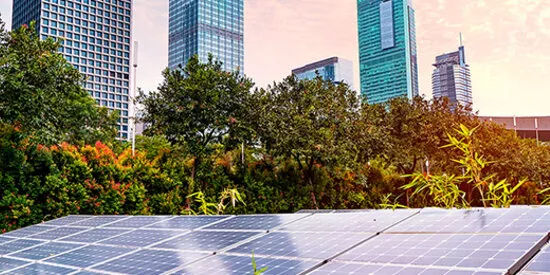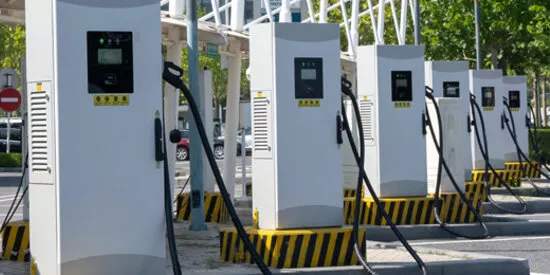
Providing green liquidity: Sustainable working capital for China’s energy transition
A key player in the Asia Pacific renewable energy sector has accessed essential working capital through a pioneering green working capital loan. Societe Generale’s teams worked closely together to provide the advice and funding that made it all happen.
The decarbonisation of the global energy sector is the most urgent priority in the fight to limit climate change to less than 1.5°C. During COP 26, the 197 parties to the UN climate change agreement committed in last November to reduce the use of coal-fired power generation, which still represent up to 20% of the electricity mix in advanced economies.1 Removing fossil fuels from the energy mix, however, will require renewable energy companies to scale up rapidly, providing the generation resources needed to replace carbon-intensive power plants as they are decommissioned and keeping pace with economic growth.
Access to funding will be a critical factor in dictating the pace of this energy transition. Renewable energy developers are already attracting huge amounts of investment from governments and motivated fund managers, but there are still hurdles to overcome. Any incremental allocation of capital has the potential to accelerate the transition.
The last two years have been challenging for renewable energy developers, as lockdowns and disruptions to supply chains have slowed delivery of essential components, tying up valuable funds. In these circumstances, maintaining sufficient liquidity to manage their day-to-day operations is challenging.
Beijing Energy International Holding Co., Ltd. (BEIH) has demonstrated how companies in the renewable energy sector can benefit from their sustainable activities in their working capital arrangement. The company recently agreed a USD 100 million (EUR 89 million) green working capital loan, arranged by Societe Generale, to support its clean energy projects in China and overseas.
Accelerating the low carbon transition
Hong Kong-listed BEIH has a primary focus on investing in and developing solar and other renewable energy infrastructure. According to BEIH’s ESG Report, its mission is “to lead the development of a new energy industry, and to further promote the joint development and sharing of low-carbon and clean energy around the world.”2
Formerly known as Panda Green Energy, BEIH has become a strategically important platform for state-owned Beijing Energy Holdings, which invested in the company in 2020. Its portfolio comprises 97 solar power plants with aggregate installed capacity of about 4,168 MW and a total electricity generation volume of approximately 3,879,751 MWh. It builds and operates solar power plants and other renewable energy resources, with a presence in 21 regions across China.3 It is also extending its reach to other countries across the Asia Pacific region, helping accelerate progress toward China’s national net-zero goals.
Tapping green liquidity
To keep BEIH’s development strategy on track, Societe Generale advised the company on structuring a green working capital loan. The bank’s Sustainable and Positive Impact Finance experts worked with the company to define the use of proceeds that will be eligible under the loan’s green label.
Specifically, the proceeds of the loan will apply only to the development of BEIH’s wind power and solar energy projects in China, Vietnam, Australia and Japan. The funds will support BEIH’s payments and cash management activities and transactional FX requirements in relation to these projects. The use of proceeds will be closely monitored via regular reporting. The loan is fully covered by a corporate guarantee issued by BEIH’s parent, Beijing Energy Holdings, underlining the strategic importance of the renewable energy projects to the state-owned group.
“Our renewable infrastructure development projects require access to liquidity for cross-border transactions,” said Wang Yang, Finance Director at Beijing Energy International Holding Co., Ltd. “It is a great advantage to us that we can secure new sources of liquidity based on our activities in the renewable sector.”
“Enabling Beijing Energy International Holding to access the liquidity needed for essential operations required close co-operation between Societe Generale’s Payments & Cash Management and Sustainable and Positive Impact Finance experts. By working together, we have enabled a new client involved in developing critical alternative energy sources to access green-labelled funding, providing a cost-effective source of liquidity,” said Stephane-Alexandre Badoy, Head of Global Transaction & Payment Services for Asia Pacific at Societe Generale.
1 https://blogs.worldbank.org/voices/its-critical-tackle-coal-emissions
2 https://www.bjei.com/list-24.html
3 https://www.bjei.com/list-24.html




